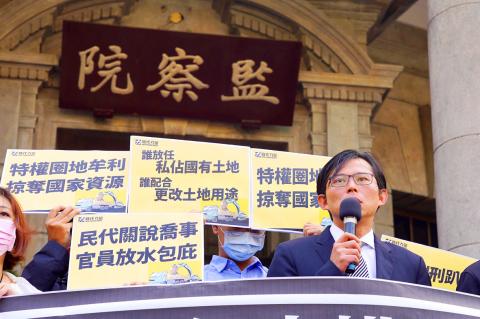New Power Party (NPP) Legislator Huang Kuo-chang (黃國昌) yesterday urged the Control Yuan to investigate Kaohsiung Mayor Han Kuo-yu’s (韓國瑜) father-in-law, Lee Jih-kuei (李日貴), accusing him of illegally occupying more than 1 hectare of public land in Yunlin County with Han’s help.
“I hope the Control Yuan can answer questions that the National Property Administration could not, including why the family was allowed to illegally occupy public land, run a gravel business there and have taxpayers cover the cost of building an embankment,” Huang told reporters outside the Control Yuan in Taipei.
“Did the government and the business conspire to break the law and abuse their power? How much of that is tolerated?” he asked.

Photo: CNA
Huang on Friday last week said that Datong Gravel Co (大通砂石行), owned by Lee, a former Yunlin County councilor, allegedly obtained control of an area near the Jhuoshui River (濁水溪) in 2000 after Han, then a legislator, lobbied for NT$6.8 million (US$222,900 at the current exchange rate) to build the embankment.
The Lee family had been excavating gravel from the area since 1995 and, as soon as it was registered as public land in 2000, they applied to have it rezoned from agricultural to mining land to benefit the gravel business, Huang said yesterday.
The Yunlin County Government approved the application in just one day, even though the land use change contravened the Regional Plan Act (區域計畫法), he said.
The county only fined the company NT$60,000 for illegal use of land and damage to the ecosystem, he said.
Ye Yuan-zhi (葉元之), who is spokesman for Han’s campaign as the Chinese Nationalist Party’s (KMT) presidential candidate, said that Huang has no evidence of wrongdoing by Han.
The only so-called evidence of Han improperly using his influence is records from meetings on the embankment project, Ye said.
“We will not play along, because we know that Huang is doing this to get attention and to promote the NPP,” he said.

INVESTIGATION: The case is the latest instance of a DPP figure being implicated in an espionage network accused of allegedly leaking information to Chinese intelligence Democratic Progressive Party (DPP) member Ho Jen-chieh (何仁傑) was detained and held incommunicado yesterday on suspicion of spying for China during his tenure as assistant to then-minister of foreign affairs Joseph Wu (吳釗燮). The Taipei District Prosecutors’ Office said Ho was implicated during its investigation into alleged spying activities by former Presidential Office consultant Wu Shang-yu (吳尚雨). Prosecutors said there is reason to believe Ho breached the National Security Act (國家安全法) by leaking classified Ministry of Foreign Affairs information to Chinese intelligence. Following interrogation, prosecutors petitioned the Taipei District Court to detain Ho, citing concerns over potential collusion or tampering of evidence. The

‘FORM OF PROTEST’: The German Institute Taipei said it was ‘shocked’ to see Nazi symbolism used in connection with political aims as it condemned the incident Sung Chien-liang (宋建樑), who led efforts to recall Democratic Progressive Party (DPP) Legislator Lee Kun-cheng (李坤城), was released on bail of NT$80,000 yesterday amid an outcry over a Nazi armband he wore to questioning the night before. Sung arrived at the New Taipei City District Prosecutors’ Office for questioning in a recall petition forgery case on Tuesday night wearing a red armband bearing a swastika, carrying a copy of Adolf Hitler’s Mein Kampf and giving a Nazi salute. Sung left the building at 1:15am without the armband and apparently covering the book with a coat. This is a serious international scandal and Chinese

Seventy percent of middle and elementary schools now conduct English classes entirely in English, the Ministry of Education said, as it encourages schools nationwide to adopt this practice Minister of Education (MOE) Cheng Ying-yao (鄭英耀) is scheduled to present a report on the government’s bilingual education policy to the Legislative Yuan’s Education and Culture Committee today. The report would outline strategies aimed at expanding access to education, reducing regional disparities and improving talent cultivation. Implementation of bilingual education policies has varied across local governments, occasionally drawing public criticism. For example, some schools have required teachers of non-English subjects to pass English proficiency

TRADE: The premier pledged safeguards on ‘Made in Taiwan’ labeling, anti-dumping measures and stricter export controls to strengthen its position in trade talks Products labeled “made in Taiwan” must be genuinely made in Taiwan, Premier Cho Jung-tai (卓榮泰) said yesterday, vowing to enforce strict safeguards against “origin laundering” and initiate anti-dumping investigations to prevent China dumping its products in Taiwan. Cho made the remarks in a discussion session with representatives from industries in Kaohsiung. In response to the US government’s recent announcement of “reciprocal” tariffs on its trading partners, President William Lai (賴清德) and Cho last week began a series of consultations with industry leaders nationwide to gather feedback and address concerns. Taiwanese and US officials held a videoconference on Friday evening to discuss the